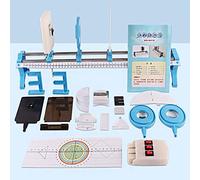
School Physics Experiment Instrument Explores The Relationship Between Mass Fish Acceleration, Newton's Second Law
School Physics Experiment Instrument Explores The Relationship Between Mass Fish Acceleration, Newton's Second Law

Cheapest Total Price
In stock
Direct debit
Direct debit
Visa
Visa
Mastercard
Mastercard
£361.15
Free Delivery
School Physics Experiment Instrument Explores The Relationship Between Mass Fish Acceleration, Newton's Second Law

In stock
Direct debit
Direct debit
Visa
Visa
Mastercard
Mastercard
£395.67
Free Delivery
School Physics Experiment Instrument Explores The Relationship Between Mass Fish Acceleration, Newton's Second Law - Details
▶ Finding you the best price!
We have found 2 prices for School Physics Experiment Instrument Explores The Relationship Between Mass Fish Acceleration, Newton's Second Law. Our price list is completely transparent with the cheapest listed first. Additional delivery costs may apply.
School Physics Experiment Instrument Explores The Relationship Between Mass Fish Acceleration, Newton's Second Law - Price Information
- Cheapest price: £361.15
- The cheapest price is offered by Amazon-marketplace.co.uk . You can order the product there.
- The price range for the product School Physics Experiment Instrument Explores The Relationship Between Mass Fish Acceleration, Newton's Second Law is €£361.15to €£395.67 with a total of 2 offers.
- Payment methods: The online shop Amazon-marketplace.co.uk supports: Direct debit, Visa, Mastercard
- Delivery: The shortest delivery time is In stock working days offered by Amazon-marketplace.co.uk .
Similar products

£278.59
Amazon-marketplace.co.uk
Free Delivery

£229.38
Amazon-marketplace.co.uk
Free Delivery

£225.28
Amazon-marketplace.co.uk
Free Delivery

£284.05
Amazon-marketplace.co.uk
Free Delivery

£132.35
Amazon-marketplace.co.uk
Free Delivery
Don't forget your voucher code:
Report Illegal Concerns
You are about to report a violation based on the EU Digital Services Act (DSA).